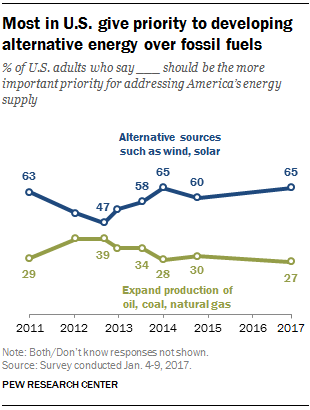News Release from windfair.net
Wind Industry Profile of
Trump and the Rest of the World: International Community Does Not Want to Give Up Climate Protection
Few hours in office and worst fears about the new US president seem to become reality: Shortly after his inauguration Donald Trump has begun to undo achievements of the Obama era as he had promised in his election campaign.
Alternative facts instead of climate protection?
Thus, towards noon last Friday (American time zone, at day of inauguration), all references to climate change disappeared from the White House homepage. During Obama's time in the office the pages pointed out dangers of global warming and promoted the use of renewable energies.
Instead, the interested user now ends up on an error message and gets succinctly the message "Thank you for your interest in this topic". Since even climate change denier Donald Trump cannot ignore the subject completely, his new website points out his idea of energy policy elsewhere.
Called 'America First', Trump is showing what his citizens can expect in the future: "For too long, we’ve been held back by burdensome regulations on our energy industry. President Trump is committed to eliminating harmful and unnecessary policies such as the Climate Action Plan and the Waters of the U.S. rule. […] Sound energy policy begins with the recognition that we have vast untapped domestic energy reserves right here in America. The Trump Administration will embrace the shale oil and gas revolution to bring jobs and prosperity to millions of Americans. We must take advantage of the estimated $50 trillion in untapped shale, oil, and natural gas reserves, especially those on federal lands that the American people own.“
The Climate Action Plan inserted by President Obama after months of battle with the Republicans last year, is thus mothballed. Instead, fossil fuels will be used again. The fact that fracking does not yet have a foreseeable, probably catastrophic effect on the environment, is of little interest to Trump.
 Survey speaks clear language
Survey speaks clear language
What his citizens think of this, however, is even much less interesting to Trump. A representative survey was published by opinion research institute PEW, where two-thirds of the Americans surveyed say they want to promote renewable energies compared to the 27 percent who prefer to promote fossil fuels (see picture on the right, image by PEW). Looking more closely at younger people aged 18 to 49, who will be most affected by climate change, this figure is shifting even further: Here, the agreement for renewables is almost three quarters. The fact that 70-year-old Trump is hardly interested in these results is a reminiscent of the vote on Brexit in the UK, also showing that younger people wanted to stay in the EU, whereas the elderly were against it.
Authorities delete measurements
Unfortunately Trump’s power as presedent is a lot greater than just to the White House. Federal authorities will also suffer from his ‘alternative facts’ in the future. As two employees of the US Environmental Protection Agency (EPA) told Reuters, the agency was instructed to delete all references to climate change from their website. This has far-reaching implications, since the pages also contain detailed measurement records including examples of how global warming has already changed the environment in recent years.
Whether the US will actually withdraw from the Paris climate agreement, as announced by Trump in his election campaign, is still unclear yet. However, the rest of the world does not wait for his decision, but acts in advance – and in a remarkable way.
China retaliates with new candor
The Chinese, who have so far competed with the US for the top spot of the biggest pollutants, announced in a statement last week that they will invest massively in environmental protection over the next few years. By 2020 alone 100 billion dollars are to be invested in wind energy to reduce the CO2 emissions of the country and create 300,000 new jobs.
Notable in addition to the level of investment is the fact that the National Energy Ministry is focusing on international cooperation and greater competition to reduce costs. Significant signals in the direction of a new candor and open markets - in sharp contrast to the new American policy.
 India calls for solidarity
India calls for solidarity
The same signals came from India on Tuesday, which surprisingly announced an expansion of the application of the Kyoto Protocol, which is already more than ten years old and contains climate protection measures for the years 2010 to 2020. The ratification now is a symbolic act for India as the subcontinent has already seen massive effects of climate change like large-scale flooding in recent years and has already begun to convert its energy policy to more sustainability.
The fact that India is now expanding the application is intended to be a signal to other emerging and developing countries, with the request to follow suit and also to provide more climate protection. On the other hand, India also wants to take on the Americans head-on and show them that they are not willing to simply give up UN's climate protection measures. “India has always emphasised the importance of climate actions by developed country parties in the pre-2020 period,” the statement by the Indian goverment reads. “Besides, it has advocated climate actions based on the principles and provisions of the convention, such as the principle of equity and common but differentiated responsibilities and respective capabilities.”
What about Europe?
The only big fish missing is Europe. Politicians here are more concerned about Britain's separation from the EU at the moment. But there have been many voices warning of Donald Trump since last year. Among other associations, German environmental protection agency Deutsche Umwelthilfe (DUH) demanded to show strength against Trump with an ambitious climate protection plan from the German government. Instead, some politicians initially vetoed the climate protection plan, which was diluted as a result.
This, however, should not be the European signal sent. In days with a Donald Trump as US president everything must be considered possible. It is thus all the more important not to put climate protection on hold to 'stabilize' transatlantic relations, but instead to build a strong front against climate change – and Donald Trump.
- Author:
- Katrin Radtke
- Email:
- kr@windfair.net
- Keywords:
- Donald Trump, India, China, Europe, US, climate protection, climate change, policy, Paris Climate Agreement
























